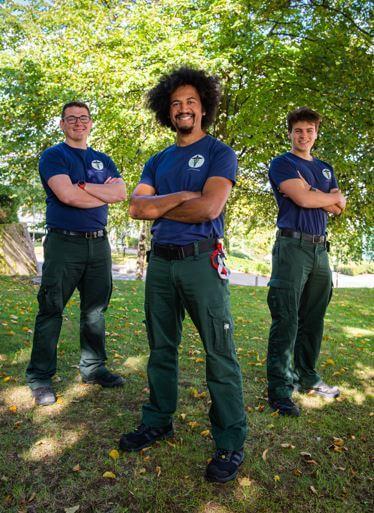Paramedic graduates ready for next challenge
WHILE most students grappled with remote learning during the pandemic, those studying paramedic science at the University of Bradford had entirely different challenges, right on the frontline.
There were sobering moments, but it was also a time when big ideas were spawned. We spoke to four students, who all graduated with a BSc (Hons) Paramedic Science this week.
Meet the Par-OAR-medics
Ken Bordt, Tom Dowdy and Ethan Chapman - known as the Par-oar-medics came up with a big plan during the pandemic - to row 3,000 miles across the Atlantic.
Ethan, 21, from Lancaster, said: “It was the middle of lockdown and suddenly Ken said he had this great idea… to row the Atlantic. When we got back to the house, he showed us a video and we all said yes. In a way it doesn’t seem real yet, and we’re aware it will be difficult to train but we are all up for the challenge.”

Pictured, from left to right: Tom Dowdy, Ken Bordt, and Ethan Chapman.
Former chef Ken, 40, originally from Zimbabwe, has previously taught scuba diving in Malaysia, Thailand and Indonesia but has almost no experience of rowing.
He said: “I have always had a great affinity for the ocean, I lived by the sea for a long time and I have long harboured an ambition to take on a challenge that involves the ocean. I originally began researching sailing around the world but stumbled on the Talisker Whisky Atlantic Challenge and I was hooked.
“I then had to find two other people mad enough to do the challenge with me - luckily, Tom and Ethan took about two minutes to come on board with the idea.”
The trio are taking on the Talisker Whisky Atlantic Challenge, officially known as the world’s toughest row, to raise money for MacMillan Cancer Support, Stroke Association UK, and the Ambulance Staff Charity. They are being sponsored by Unique Fitness (based at the university) and Abraxas Catering Equipment but are currently looking for more sponsors.
Tom, 24, said: “Bradford has been an invaluable place to learn. We’re really excited now to move into that alumni network, to get them on board, as it were. Rowing 3,000 miles across the Atlantic is something we’re all really excited about. We can’t wait.”
The group will set off on their epic adventure on December 12, 2024 - the crossing is expected to take about 35 days.
'Valuable learning'
Tom added: “I’ve taken part in a number of strange events in my life, including completing the Yorkshire Three Peaks while carrying a double bass, I’ve done some ice climbing and I once cycled from London to Santander, but this will be by far the most bonkers thing I have ever done. The fact fewer people have completed this challenge than have climbed Everest just makes it more appealing, not to mention scary.”
Ken added: “We will be rowing two-hours on, two-hours off for about 30 days, and we have to carry all our own food and water. The boat we will use will be self-righting, so if we do capsize, it will right itself. It’s a crazy challenge but we are all looking forward to it.”
Ethan said: “I am really looking forward to working as a paramedic and giving back to Bradford, a city that has given so much to me. I’m looking forward to the challenge too. We’re in training at the moment.”
Speaking about the University of Bradford’s paramedic course, which is ranked second in the country in the Complete University Guide, Ken said: “It’s the only programme in the country that offers a sandwich year in year three, which means we go out on the road and work with actual clinicians on the front line, which is such a valuable learning process, and I think it means Bradford’s course is head and shoulders above the rest.”
Since 2012, the Talisker Whisky Atlantic Challenge has been organised by Atlantic Campaigns and is now the world’s safest and most successful ocean rowing race.
Challenging moments during pandemic
For Micha Burgess, who was on placement with an ambulance crew during the pandemic, one particularly poignant moment remains.
“The moment that sticks out for me was holding the hand of a man who was dying from Covid in the back of an ambulance,” said Micha. “His family couldn’t be with him and the hospital was at full capacity.
“My crew members and I sat with him until he died, telling him it was alright. Afterwards, I called my mum and cried and cried. I hope his family took some comfort that he wasn’t alone.”

Micha, 23, from Birstall, Leeds, is now looking forward to starting her career with Yorkshire Ambulance Service, working out of Dewsbury station, where she spent a sandwich year of her degree.
She said: “My mum, dad and sister are all nurses so a career in healthcare seemed an obvious choice. I knew I didn’t want to work in a hospital so when I looked at paramedic science, it really appealed.
“You’re getting out and about, seeing all kinds of cases and across all ages. I enjoy working under pressure and pushing myself.
“You never know what you’re going to be walking into. It’s also a real privilege to be able to treat people in their homes, it’s one of the last healthcare professions that still does this. You also have the time to spend with patients, so often we will find ourselves making a patient a cup of tea and just sitting and talking with them.
“This is particularly important when we’re called out to mental health cases, which happens a lot.”
Lifesaving
One of the mental health cases Micha treated wasn’t even during a call-out, but thanks to her training at the University, she was able to prevent an emergency.
Micha said: “We were on our way to another call out, about 4am, when I spotted a man standing on a motorway bridge, looking like he was ready to jump.
“I said to my crewmate, ‘Just drive around and let’s check.’ Thanks to the University, we had sessions on suicide prevention so I put my training into practice and managed to get him into the ambulance.
“He wouldn’t go to hospital, so I spoke to the mental health team and the clinical hub and both were happy for the man to go home so long as someone would be there with him. A referral was also made to the Single Point of Access Team, which is an access point for referrals to specialist mental health services.
“I took the man home and urged his family to get in touch with his doctor, telling them he is really struggling, and they thanked me and gave me a big hug. It was the first time I thought, ‘I’ve actually helped save a life.’”
-501x579.jpg)
Micha worked part time at DIY store, Screwfix, to help fund her way through university and reckons the skills she learned in customer service have helped her as a paramedic.
She said: “I learned to speak to people in the community and build up a rapport with them, which is essential in this job. A lot of times, patients might not need anything other than having someone to talk to. If you can’t relate to people, I think you would really struggle.”
